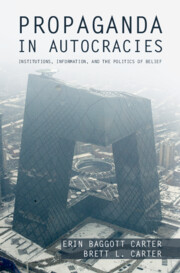Book contents
- Frontmatter
- Dedication
- Epigraph
- Contents
- Figures
- Tables
- Acknowledgments
- Part I Foundations
- 1 Persuasion and Domination
- 2 A Theory of Autocratic Propaganda
- 3 A Global Dataset of Autocratic Propaganda
- Part II The Political Origins of Propaganda Strategies
- 4 The Politics of Pro-regime Propaganda
- 5 Narrating the Domestic
- 6 Narrating the World
- 7 Threatening Citizens with Repression
- Part III The Propaganda Calendar
- 8 The Propagandist’s Dilemma
- 9 Memory and Forgetting
- Part IV Propaganda, Protest, and the Future
- 10 Propaganda and Protest
- 11 Conclusion
- References
- Index
- Other books in the series
9 - Memory and Forgetting
Published online by Cambridge University Press: 18 July 2023
- Frontmatter
- Dedication
- Epigraph
- Contents
- Figures
- Tables
- Acknowledgments
- Part I Foundations
- 1 Persuasion and Domination
- 2 A Theory of Autocratic Propaganda
- 3 A Global Dataset of Autocratic Propaganda
- Part II The Political Origins of Propaganda Strategies
- 4 The Politics of Pro-regime Propaganda
- 5 Narrating the Domestic
- 6 Narrating the World
- 7 Threatening Citizens with Repression
- Part III The Propaganda Calendar
- 8 The Propagandist’s Dilemma
- 9 Memory and Forgetting
- Part IV Propaganda, Protest, and the Future
- 10 Propaganda and Protest
- 11 Conclusion
- References
- Index
- Other books in the series
Summary
In the absence of regular elections, the chief moments of tension are often anniversaries of failed pro-democracy movements, which routinely implicate the regime in crimes against citizens. This chapter explores a trade-off. Propaganda content intended to threaten citizens may be useful to deter protest, but draws attention to moments that the regime might prefer citizens forget. This chapter explores how the most repressive governments resolve this tension between memory and forgetting. The CCP, we find, goes to extraordinary lengths to scrub pro-democracy anniversaries from public consciousness, and so reserves propaganda spikes and threats of repression for major political events and the anniversaries of ethnic separatist movements. There is, however, one pro-democracy anniversary that the CCP knows citizens will not forget: the Tiananmen massacre of June 4, 1989. Since the Xinjiang Uprising of 2009, on each anniversary of the Tiananmen massacre, the CCP has used propaganda to remind Beijing’s urban class of ongoing repression against ethnic Uyghurs, millions of whom have been incarcerated. Using a survey experiment, we show that many citizens interpret this as threatening.
Keywords
- Type
- Chapter
- Information
- Propaganda in AutocraciesInstitutions, Information, and the Politics of Belief, pp. 371 - 410Publisher: Cambridge University PressPrint publication year: 2023

